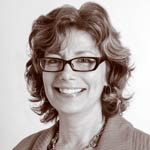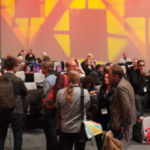While serving on the executive committee responsible for creating the educational content for the Public Relations Society of America’s (PRSA) annual Travel and Tourism Conference over the last three years, Malcolm Griffiths has focused on “shaking up the way we do professional development.” For Griffiths, vice president of New York City–based place-marketing firm Development Counsellors International (DCI), that’s meant “pushing the boundaries” of the traditional speaker or panel format to provide “a more interesting, informative, engaging, and fun” experience for PRSA’s audience — 300-plus public-relations professionals who represent destinations throughout North America.

When he proposed a session format for the 2015 Travel and Tourism Conference that was modeled after the hit TV series “The Voice” — in which four music-industry veterans choose aspiring singers to coach who compete against each other — “there were a few skeptics on the board,” Griffiths said. “Everyone was a little nervous. You think, Okay, this is either going to be really awesome or it’s going to flop massively.”
But Griffiths had good reason to believe the game-show format would go over well. He had emceed a successful “Dating Game”–style competition — with meeting-planner “bachelors” posing questions to DMO “contestants” for the chance to go on a DCI-sponsored fam-trip “date” — at DMAI’s 2011 Annual Convention. His fellow committee members agreed to try out “The Pitch” — patterned after “The Voice,” and adapted for PR professionals — and “thankfully,” Griffiths said, when it debuted at the 2015 Travel and Tourism Conference, it was “hugely successful.” From that first version, Griffiths implemented “a few learnings” for “The Pitch” at this year’s conference — held at the Four Seasons Hotel Houston on May 22–25 — that made it even better.
“I was just blown away by how well this second year in Houston went,” Griffiths said. “The format continues to get rave reviews from our post-conference surveys, and from the feedback that I’ve been receiving, it was the highlight of the conference.”
WARMING UP
The hour-and-a-half morning general session, held on the second full day of the conference, involved “a lot of work on the back end,” Griffiths said. The goal of “The Pitch” was to help the audience hone their skills promoting their destinations to the media — pitching — by listening to their peers. Three “renowned editorial decision makers” who were presenting at other sessions during the conference served as judges: Jay Heinrichs, editorial director for Southwest Airlines’ Southwest: The Magazine; Andrew Nelson, travel editor for National Geographic; and David Duran, a travel journalist.
After the registration cut-off date, registrants received an email inviting them to apply for “The Pitch” by submitting a 50-word paragraph about the destinations they represent. Thirty PR-professional attendees submitted pitches, and 12 were selected by the judges to present at the conference.
What would entice PR professionals to step out of their comfort zone to be judged by a jury and their peers? For someone working in the travel industry, the grand prize was a dream incentive: a National Geographic–sponsored trip to the Galapagos Islands. The second-place prize, also sponsor-provided, was a $500 Travelocity gift voucher.
MAKING THE ROUNDS
Griffiths started the session by explaining the three-stage competition format to the audience and encouraging them to vote for their favorite contestants using a text-to-vote tool on their smartphones. In the first “blind audition” round, the 12 initial contestants read their original winning pitches. When one of the three judges — who were seated onstage in oversized swivel chairs with their backs to the contestants — liked a pitch, he spun around, just like on “The Voice,” to bring that contestant onto his team. Each judge chose two contestants, plus the audience could vote for two other contestants for the Wild Card category, meaning four contestants were eliminated during the first round. The remaining eight then went on to the battle round; those who survived the battle round would compete in the final round.
The first-round winners left the general-session ballroom to prepare for the battle round, during which the teams would compete internally, with only one member from each chosen for the final round. Each team was given a sheet with one theme and salient facts about a particular aspect of the Travel and Tourism Conference’s host city that the Greater Houston Convention & Visitors Bureau wanted to spotlight: its culinary offerings, arts-and-culture scene, and parks system.
The contestants had seven minutes to prepare one-minute pitches based only on the facts they were given. While they were writing their pitches, Griffiths facilitated a Q&A session with the audience, giving attendees the opportunity to ask the judges what kinds of story approaches resonate with them.
Once the contestants returned to the ballroom, they delivered their Houston pitches, then received feedback from the judges. Next, the audience voted on which person from each team would go on to the final round. “What I really like about the battle round,” Griffiths said, “is how you can give two people the same information on what to pitch, but then how they interpret the information and how they pitch that information can be very, very different.”
The four remaining contestants — the three battle-round winners plus the wild-card winner —went through the same process again for the final round. This time, Visit Palm Springs, which is hosting PRSA’s 2017 conference, supplied all of the contestants with the same facts about its arts-and-culture offerings. They again were given seven minutes to develop their pitches. Each contestant gave a final pitch and got feedback from the judges, and then, based on the audience’s votes, a winner was named.
GALAPAGOS-BOUND
In the end, it was a pop-culture approach — a “Mad Men”/Don Draper–inspired Palm Springs pitch — that earned the top prize for finalist Marcus Hibdon, national communications and PR manager for Travel Portland. “It was about trying to find a way to stand out in front of the audience,” Hibdon said. “When you pitch journalists, in my role as a PR professional, it’s about standing out from other destinations. I think especially in the battle round, it really, really required that skill and understanding of, how do I make this sound different? In tourism PR, let’s be honest, a lot of destinations have similar assets. Everywhere you go is farm-to-table these days. Everywhere you go there’s craft beer. Really, for domestic travel, a lot of the things that have been a touchstone for Portland, a lot of other destinations are now doing. I think I had a little bit of experience saying, ‘Okay, how do I stand out amidst a crowded field?’”
Despite having that edge, Hibdon found the competition “incredibly difficult and very intimidating,” considering the level of talent he said he was up against and the “very, very short time” they had to prepare their pitches about destinations with which they were unfamiliar. “It really made you focus,” he said, “on the basics of how you do your job.”
And if it “were not for that incredible, amazing prize from National Geographic,” Hibdon said, he probably wouldn’t have risked competing. “Now that it’s all said and done — and I haven’t even taken the trip yet — I’m very glad I did it, regardless of what the prize was. It was valuable for me. I would suggest that anybody do this, because it’s extremely uncomfortable to get up in front of your peers when you know that they are judging you in the same way that you would judge them. I learned a lot from the experience, but I also had people come up afterwards and say that they learned a lot — you can learn a lot from your peers.”
Griffiths said he fully appreciates that it “takes a lot of guts” to compete in this kind of session. “It’s tough to get up there in front of 300 of your closest colleagues and the media, to do what they did,” he said. For that reason, even though “it sounds kind of lame, everyone who participated, to me, is a winner.”




